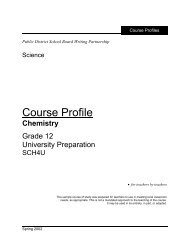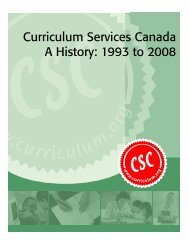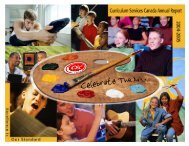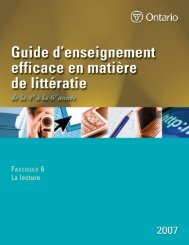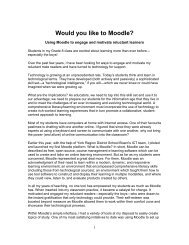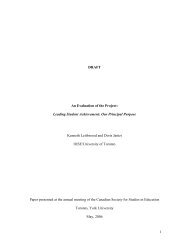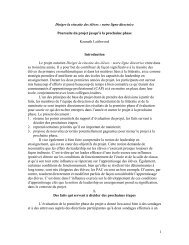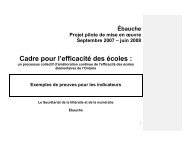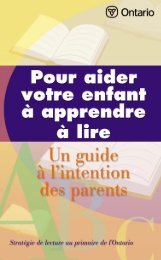Aboriginal Beliefs, Values, and Aspirations in Contemporary Society
Aboriginal Beliefs, Values, and Aspirations in Contemporary Society
Aboriginal Beliefs, Values, and Aspirations in Contemporary Society
Create successful ePaper yourself
Turn your PDF publications into a flip-book with our unique Google optimized e-Paper software.
Course Overview<br />
<strong>Aborig<strong>in</strong>al</strong> <strong>Beliefs</strong>, <strong>Values</strong>, <strong>and</strong> <strong>Aspirations</strong> <strong>in</strong> <strong>Contemporary</strong> <strong>Society</strong>,<br />
Grade 11, College Preparation, NBV3C<br />
Course Description<br />
This course is designed as a study of how beliefs <strong>and</strong> values shape <strong>Aborig<strong>in</strong>al</strong> peoples’ history, culture,<br />
<strong>and</strong> aspirations. This course elaborates on how values, beliefs, <strong>and</strong> spirituality form <strong>Aborig<strong>in</strong>al</strong> peoples’<br />
identity <strong>and</strong> how colonial experiences have threatened <strong>and</strong> impacted on <strong>Aborig<strong>in</strong>al</strong> peoples. Students<br />
exam<strong>in</strong>e how <strong>Aborig<strong>in</strong>al</strong> peoples underst<strong>and</strong> their natural <strong>and</strong> cosmological environment <strong>and</strong> explore<br />
how their world views <strong>and</strong> philosophies have had an impact on relationships with EuroCanadian society<br />
both historically <strong>and</strong> <strong>in</strong> the present. The relevant topics of this course are representation, colonialism,<br />
world views, accomplishment, renewal, reconciliation, <strong>and</strong> revitalization. The question “Who def<strong>in</strong>es<br />
<strong>Aborig<strong>in</strong>al</strong> identity?” is rigorously explored for the purpose of underst<strong>and</strong><strong>in</strong>g how identity is related to<br />
colonialism.<br />
The history of the relationships among the <strong>Aborig<strong>in</strong>al</strong> peoples themselves, then later with Canadian<br />
society, provides <strong>in</strong>sight <strong>in</strong>to issues of ethnocentrically-biased representation of another culture <strong>and</strong> the<br />
response of <strong>Aborig<strong>in</strong>al</strong> peoples to reclaim their voices <strong>in</strong> matters of representation. Through this process,<br />
students exam<strong>in</strong>e how <strong>and</strong> why it is critically important for <strong>Aborig<strong>in</strong>al</strong> peoples to represent their own<br />
values <strong>and</strong> beliefs. Through <strong>Aborig<strong>in</strong>al</strong> peoples’ own voices, students learn of significant contributions<br />
that <strong>Aborig<strong>in</strong>al</strong> peoples have made not only to their own cultures, but also to Canada as a whole.<br />
Students underst<strong>and</strong> how collective peoples’ experiences have shaped their beliefs, values, <strong>and</strong><br />
aspirations. Knowledge about <strong>Aborig<strong>in</strong>al</strong> peoples promotes student underst<strong>and</strong><strong>in</strong>g of contemporary<br />
renewal <strong>and</strong> reconciliation <strong>in</strong>itiatives that <strong>Aborig<strong>in</strong>al</strong> peoples are currently engaged <strong>in</strong> with the<br />
governments <strong>and</strong> people of Canada. By redef<strong>in</strong><strong>in</strong>g their relationship to the country as a whole, <strong>and</strong> to<br />
their own communities, students learn how <strong>Aborig<strong>in</strong>al</strong> peoples are pursu<strong>in</strong>g new ways to articulate<br />
historical aspirations of self-reliance, self-determ<strong>in</strong>ation, <strong>and</strong> self-governance.<br />
While the priority is given to local <strong>Aborig<strong>in</strong>al</strong> peoples, it is expected that students explore beliefs, values,<br />
<strong>and</strong> aspirations of <strong>Aborig<strong>in</strong>al</strong> peoples throughout Canada. This course also pays special consideration to<br />
the unique experiences, contributions, <strong>and</strong> aspirations of <strong>Aborig<strong>in</strong>al</strong> women. The exploration of<br />
<strong>Aborig<strong>in</strong>al</strong> women’s historical role as well as their contemporary realities is critical <strong>in</strong> the study of<br />
<strong>Aborig<strong>in</strong>al</strong> peoples given <strong>Aborig<strong>in</strong>al</strong> women’s unique experiences as women <strong>in</strong> this country.<br />
Exam<strong>in</strong>ation of the impact that the Indian Act has had <strong>and</strong> cont<strong>in</strong>ues to have on <strong>Aborig<strong>in</strong>al</strong> women<br />
allows for a richer underst<strong>and</strong><strong>in</strong>g of gender issues relevant to <strong>Aborig<strong>in</strong>al</strong> peoples. The subtext of the<br />
course is an underst<strong>and</strong><strong>in</strong>g of the historical <strong>and</strong> contemporary aspirations of <strong>Aborig<strong>in</strong>al</strong> peoples <strong>in</strong> their<br />
attempt to self-determ<strong>in</strong>e their future goals <strong>and</strong> aspirations.<br />
Course Notes<br />
Develop<strong>in</strong>g a methodology to teach about <strong>Aborig<strong>in</strong>al</strong> beliefs, values, <strong>and</strong> aspirations <strong>in</strong> contemporary<br />
society requires structured preparation by teachers <strong>and</strong> establish<strong>in</strong>g clear parameters for <strong>in</strong>vestigation by<br />
students. The diversity of cultural, l<strong>in</strong>guistic, racial, <strong>and</strong> religious groups is a valuable characteristic of<br />
Canadian society, <strong>and</strong> <strong>in</strong>deed of <strong>Aborig<strong>in</strong>al</strong> people with<strong>in</strong> Canadian society. Teachers may wish to focus<br />
on local cultural groups, on regional studies of <strong>Aborig<strong>in</strong>al</strong> peoples, or on case studies of specific cultural<br />
<strong>and</strong> spiritual practices with<strong>in</strong> Canada. Focus could be on First Nation communities, on Inuit beliefs <strong>and</strong><br />
experiences, or on Métis. Individuals <strong>and</strong> organizations who represent <strong>Aborig<strong>in</strong>al</strong> peoples, elders with<strong>in</strong><br />
communities, gr<strong>and</strong>mothers, aunts, healers, writers, artists, <strong>and</strong> performers who exemplify <strong>and</strong> celebrate<br />
<strong>Aborig<strong>in</strong>al</strong> identity, beliefs, values, <strong>and</strong> aspirations provide sources of <strong>in</strong>formation <strong>and</strong> <strong>in</strong>spiration for<br />
students <strong>and</strong> teachers.<br />
Page 1<br />
• <strong>Aborig<strong>in</strong>al</strong> <strong>Beliefs</strong>, <strong>Values</strong>, <strong>and</strong> <strong>Aspirations</strong> <strong>in</strong> <strong>Contemporary</strong> <strong>Society</strong> - College Preparation



